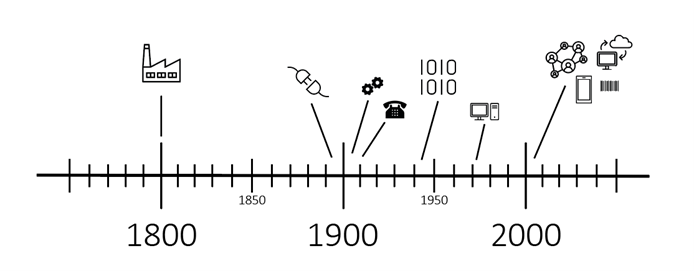We are encountering the term Industry 4.0 more and more often these days. The concept behind it ensures that we as humans are connected to the systems we work with. But what exactly is Industry 4.0? And why is it crucial to adapt to this new, digitized environment? Let’s dive deeper into these questions.
The status quo over time
First, let’s have a quick look at the stages of development of industry in general over the past decades and centuries.
Industry 1.0: Around 1800, there are first records of mass production with machines. Successes of this period were developments in industries such as railroad construction, coal mining and steam navigation. As a result, these new developments provided a large number of jobs and new careers. Also, the British mathematician Ada Lovelace laid the foundation for later programming languages by describing the first algorithm based on a mechanical computer.
Industry 2.0: The 2nd Industrial Revolution took place at the end of the 19th century with the use of electricity. At the beginning of the 20th century, plants could now also be automated. In addition, motors and assembly lines allowed increased production. Increasingly important was now also communication in the working world, with telephone calls, telegrams and typewriters.
Industry 3.0: Around the middle of the 20th century, the first computers came into play. Pioneered by the world's first working computer, the Z3, designed by German civil engineer Konrad Ernst Otto Zuse in 1941. This computer was program-controlled, freely programmable and fully automated, which opened the doors for IT. From the 1970s, automation was pushed further, with large calculators and personal computers for offices and homes.
Industry 4.0: With Industry 4.0 in the present day, the focus is on the digitization of analog techniques and the integration of cyber-physical systems, with the overriding goal being the networking of machines, products, and people. There is now the possibility of producing on demand and actual demand in addition to manufacturing for stock, saving time and resources. In addition to new aspects, such as new forms of communication and the digitalization of classic industries such as the construction industry, consumer goods and packaging are now also connected to the internet through their barcodes.

Aspects driven by Industry 4.0 today are such as new product designs being produced very quickly, one-offs being manufactured effortlessly, and the quick response to new market conditions. Areas such as self-driving cars, 3D printing, and advanced robotics are also results of the ever-advancing Industry 4.0.
Why Industry 4.0 is crucial in practice
The age of Industry 4.0 holds many advantages for manufacturers but also for customers. Intelligent information and communication technologies can make various areas of everyday business more efficient. Examples include that:
- Production is made flexible by digitally networking production steps and associated companies. This results in better coordination, planning and capacity utilization, as well as fast production and production changes when a product evolves.
- Solutions are customer-centric, which means that customers themselves can help to individually design the desired products, for example by incorporating their own design elements. In turn, a customer's multitude of smart products can send data to the manufacturing company, allowing it to analyze and improve its products.
- Data that products provide on production and condition is analyzed and used for more efficient manufacturing, new business models and service offerings.
- Logistics chains are optimized by Industry 4.0, as algorithms calculate ideal delivery routes, report shortages of materials from machines, and optimize chains of goods, resulting in an optimal flow of goods and workflow.
- Economy in Industry 4.0 runs in a resource-saving manner, as consideration is already given in design, as well as later in production, to which materials can be reused and how. In addition, virtual tests are carried out before production to avoid possible production errors.
Ultimately, Industry 4.0 will increase the economic efficiency of products, ensure flexibility in their production, and strengthen competitiveness in the industry.

Considering statistics that have been collected in recent years, the importance of Industry 4.0 can no longer be denied. In 2020, a study from Deloitte found that companies surveyed with an effective Industry 4.0 strategy were more successful economically than those without. Of them, 18% grew by 20% or more in the past year, while only 3% of companies without such a strategy achieved comparable growth.
According to the 2016 study by EUROFORUM, the increase in gross value added through Industry 4.0 is significantly higher, which is the case in all industries regarded. In mechanical and plant engineering, for example, the additional gross value added with Industry 4.0 amounts to more than 23 billion euros.
Looking to the future, a 2014 analysis by BITKOM together with the Fraunhofer Institute for Industrial Engineering forecasts that Industry 4.0 is expected to generate additional value creation potential of 78 billion euros in affected industries by 2025, corresponding to an annual growth of 1.7 percent.
Conclusion
All in all, the importance of Industry 4.0 can no longer be denied today. Not only is the implementation of Industry 4.0 at an all-time high, but research in this field is also steadily advancing, one example being over 3,280,000 results on Google Scholar.
As mentioned in this article, advantages for producers but also for customers are possible with Industry 4.0. Especially the studies mentioned above show that digitizing factories can lead to improvements in terms of financial success, growth, and value.
This leads to the conclusion that it is crucial for manufacturing companies to consider digitizing their plants towards Industry 4.0, to enable the entire process of manufacturing a product to be as efficient as possible.
To learn more about how the United Manufacturing Hub integrates into Industry 4.0, visit us: https://www.umh.app/




